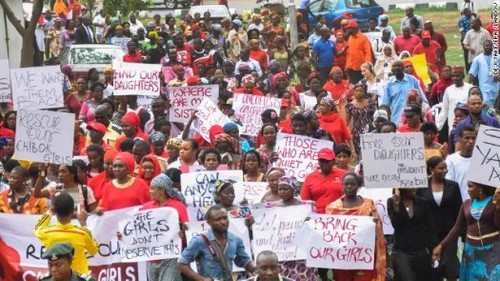#nigerian girls
Hi

Protesters in Nigeria attempt to raise awareness of the abducted school girls. (turner.com)
Around 11 p.m. on April 14th, a Chibok government official received a phone call alerting him that about 200 heavily armed militants in 20 trucks and 30 motorcycles were on the way towards his town. He alerted the 15 soldiers guarding Chibok, in rural northeast Nigeria, and roused sleeping locals, telling them to flee to the bush. The militants arrived two hours later.
The local soldiers held off the insurgents for an hour and a half, when they ran out of ammunition and ran. They headed to a boarding school, set it on fire, and put an estimated 300 girls on their pickup trucks and headed out. They made it through three villages until a car of fighters broke them down, where some girls fled. The remaining 276 girls are yet to be found.
This story is familiar by now. By the time you read “Chibok,” or at least “Nigeria,” you most likely knew the story I was narrating. It did spark four million tweets and involvement from celebrities and politicians from all corners of the world. But this Monday marks the three month anniversary of the girls’ abduction, and the rest of the world has mostly forgotten.
The families of the girls, though, have not. “I am so very sad because the government of Nigeria did not take care of our children and does not now care about our children,” the mother of a 15 year old abducted said to the Associated Press.
Videos released by Boko Haram, the terrorist group that abducted the girls and has been wreaking havoc on Nigeria, claim the girls will be sold into marriage or used as slaves. They show the girls, many of whom were Christian, wearing Muslim clothing and reciting Qaranic verses.
“I swear to almighty Allah you will not see them again until you release our people that you have captured,” said leader Abubakar Shekau in one of the videos, referring to members of Boko Haram held hostage by Nigeria.
The Nigerian government has been contradictory in their remarks on the situation: this May, some claimed that they would never negotiate with terrorists, while others stated that such talks were going to take place soon. Later in May, the Nigerian military announced that they knew where the girls were, but couldn’t attempt a rescue. Since then, there have been little to no efforts by the Nigerian military, blamed by most on their lack of supplies and funds.
In the three months since the girls were forced out of their dorms at 2 in the morning by armed terrorists, Israeli-Palestinian conflict fired up again. The U.S. Supreme Court ruled that police can’t search cell phones without a warrant and that companies don’t need to provide birth control to employees. The class of 2014 graduated from high school and college. J.K. Rowling published a new Harry Potter story. Facebook conducted a controversial psychological experiment, and two twelve-year olds stabbed their friend in the name of Slenderman.
As headlines fly in one ear and out the other, hot topics for a week or two before being forgotten, the girls are still gone. Dead or alive, Christian or Muslim, slaves, wives, or whatever else, they deserve the attention we promised with our valiant hashtag campaign.
Said Naunihal Singh in the New Yorker, “If all our tweets and Instagram posts were truly driven by a desire to help these girls, then we have to stand with the people of Nigeria long after it is fashionable to do so.”


